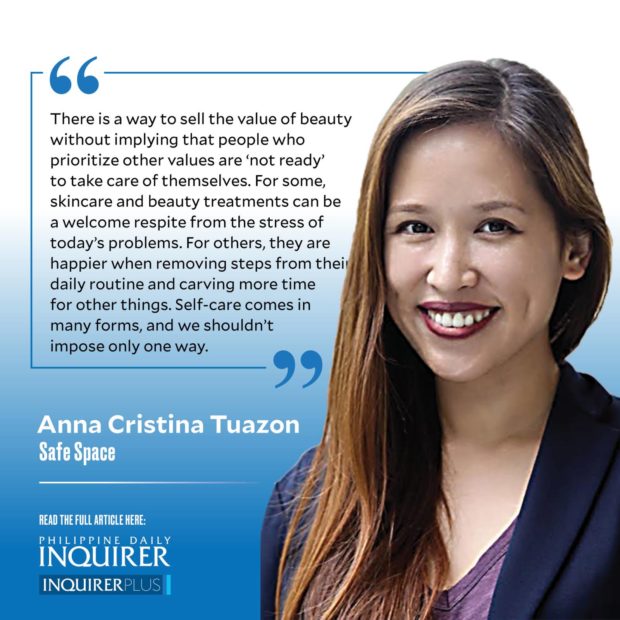Letting go of beauty standards is self-care
Another week, another outrage. Last week, the Belo Medical Group released a since-deleted video ad that depicted a woman slowly gaining weight, getting acne, and growing body hair as she watches the news. The ad ends with a friend on the other end of a video call asking “anong nangyari?” then cuts to a reminder to book for a consultation. The company’s social media team didn’t help when they replied to one of the comments and said that “if you’re ready to make the decision to take care of yourself again, we are here to help. Ready when you are.”
It is honestly shocking that no one in Belo Medical Group or in Gigil, the ad agency responsible for the video, anticipated the backlash against their body-shaming video. (I’m more likely to believe that groupthink was at play. Groupthink is a social phenomenon where the desire for consensus and harmony in meetings lead to irrational and reckless decision-making. Perhaps some people privately questioned the hurtfulness of the video but held their tongues for fear of being shot down.)
Article continues after this advertisementBoth companies released statements apologizing for the ad, describing the video as “insensitive and upsetting” with vague promises to “do better.” An essential part of a good apology — something that seems terribly rare in our social landscape nowadays — is a clear acknowledgment of the wrongdoing and not just the description of others’ reactions. Do they know exactly what was insensitive and upsetting about their content? Or do they simply mean to say that others were sensitive and became upset?
For most of this pandemic, me and my colleagues in mental health find ourselves going up against societal expectations that increase unnecessary suffering. I have made it a point of principle, for example, to request organizers to show that their company is willing to make significant adjustments in their work and productivity expectations to allow their workers more time and energy for self-care before I accept their invitations to talk about mental health. What is the point of a single-session mental health webinar when their stressors remain chronic and exacerbated? Societal beauty standards are another beast to contend with. In a period where our time, money, and energy are spent mostly on trying to survive and adapt to ever-changing safety conditions, the last thing we need is to feel shame and embarrassment about how we look.
In fact, in the past year, a lot of us have realized that there are many things we can live without. More importantly, people have begun appreciating the tremendous value of comfort. When not required (or not visible onscreen), most people now opt for comfort in their clothing. They’ve also opted for comfort and simplicity in their routines, including skin care and diet. Part of taking care of ourselves means acknowledging that some expectations are just unnecessary and choosing to let go of standards that do not serve us. Social distancing and quarantine have allowed us to reflect on what beauty means to us when no one is looking.
Article continues after this advertisementThere is a way to sell the value of beauty without implying that people who prioritize other values are “not ready” to take care of themselves. For some, skincare and beauty treatments can be a welcome respite from the stress of today’s problems. For others, they are happier when removing steps from their daily routine and carving more time for other things. Self-care comes in many forms, and we shouldn’t impose only one way.
Another misconception about self-care is that it is an individual endeavor. “Come to us when you’re ready” implies that readiness is solely up to the person. We need a supportive and non-judgmental environment in order to properly exercise self-care. Most of the factors impinging on our health and wellbeing are external, such as financial stress, the health and safety of our loved ones, and meeting work and social expectations. As such, we need community and systemic supports — accessible and reliable social welfare programs for those economically affected by the pandemic, sound and reasonable public health strategies as well as adequate health care, and humane and flexible work policies from employers — to give us space to care for ourselves. No single company or ad agency can of course provide these solutions. But they can do their part in ensuring that they’re not perpetuating the myth of self-care as an individual problem.

















